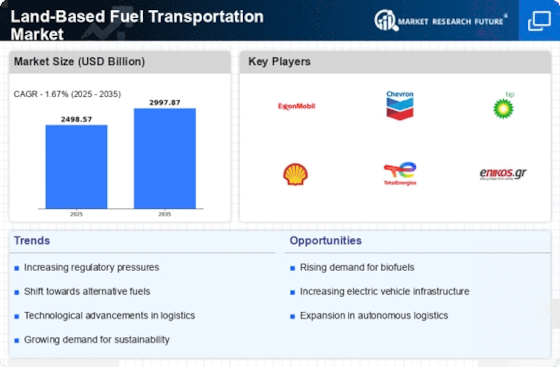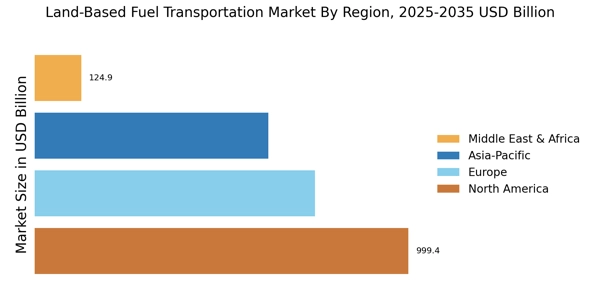Rising Fuel Prices
The Land-Based Fuel Transportation Market is significantly influenced by the volatility of fuel prices. Fluctuations in crude oil prices can lead to increased operational costs for transportation companies, prompting a shift towards more efficient fuel alternatives. In recent years, the average price of diesel has seen considerable increases, which has compelled logistics firms to explore cost-effective solutions. This trend may drive investments in alternative fuels and technologies, as companies seek to mitigate the impact of rising fuel costs. Consequently, the Land-Based Fuel Transportation Market could witness a transformation as businesses adapt to these economic pressures, potentially leading to a more diversified fuel landscape.
Regulatory Support for Clean Energy
The Land-Based Fuel Transportation Market is experiencing a notable shift due to increasing regulatory support for clean energy initiatives. Governments are implementing stringent emissions standards and providing incentives for the adoption of cleaner fuels. This regulatory environment encourages companies to invest in alternative fuel technologies, such as biofuels and electric vehicles. For instance, recent policies have mandated a reduction in greenhouse gas emissions by 30% by 2030, which is likely to drive demand for cleaner transportation solutions. As a result, the Land-Based Fuel Transportation Market is poised for growth as stakeholders adapt to these regulations, potentially leading to a more sustainable transportation ecosystem.
Consumer Demand for Sustainable Practices
Consumer demand for sustainable practices is increasingly influencing the Land-Based Fuel Transportation Market. As awareness of environmental issues grows, consumers are favoring companies that prioritize sustainability in their operations. This shift in consumer behavior is prompting transportation firms to adopt greener practices, such as utilizing alternative fuels and optimizing logistics to reduce carbon footprints. Market Research Future indicates that over 60% of consumers are willing to pay a premium for environmentally friendly transportation options. This trend is likely to drive innovation and investment in sustainable technologies within the Land-Based Fuel Transportation Market, as companies strive to meet evolving consumer expectations.
Technological Advancements in Transportation
Technological advancements are playing a pivotal role in shaping the Land-Based Fuel Transportation Market. Innovations such as automated logistics systems, telematics, and fuel-efficient vehicles are enhancing operational efficiency and reducing costs. The integration of smart technologies allows for real-time tracking and optimization of fuel consumption, which is crucial in a competitive market. Moreover, the development of electric and hybrid vehicles is gaining traction, with projections indicating that electric vehicle sales could reach 30% of total vehicle sales by 2030. This technological evolution is likely to redefine the Land-Based Fuel Transportation Market, fostering a shift towards more sustainable and efficient transportation solutions.
Infrastructure Development for Alternative Fuels
Infrastructure development is a critical driver for the Land-Based Fuel Transportation Market, particularly concerning alternative fuels. The establishment of refueling stations for biofuels, electric vehicles, and hydrogen is essential for facilitating the transition to cleaner transportation options. Recent investments in infrastructure have been aimed at expanding the availability of alternative fuel sources, which is crucial for encouraging adoption among consumers and businesses alike. For example, the number of electric vehicle charging stations has increased significantly, with projections suggesting a growth rate of 25% annually. This infrastructure expansion is likely to bolster the Land-Based Fuel Transportation Market, enabling a smoother transition towards sustainable fuel alternatives.

















